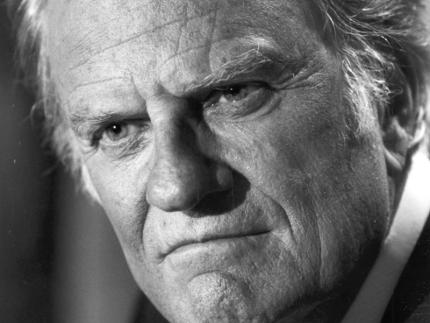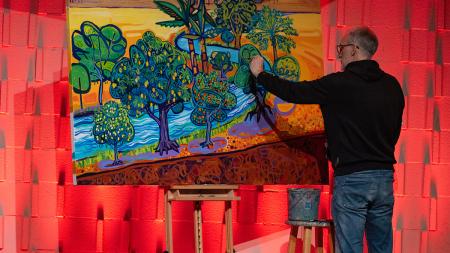Remembering Billy Graham

Religion News Service
Billy Graham, a pastor to U.S. presidents and a preacher who influenced ministers and parishioners of many denominations, died this morning at his North Carolina home at the age of 99.
Many people have referred to Graham as perhaps the most significant religious figure of the 20th century. He helped to spawn a movement of evangelical, Bible-rich Christianity that continues to grow worldwide.
In his years as an evangelist, Graham traveled to dozens of countries, bringing the gospel message to more than 100 million people. Of that number, some three million came forward during his crusades to embrace Jesus Christ.
“Billy Graham was an inspiration to many people, especially to other preachers who learned from him and perhaps entered the ministry because of him,” said Steven Timmermans, executive director of the Christian Reformed Church in North America.
“Billy Graham’s influence can certainly be felt in our church. Many of our evangelistic efforts came out of the era in which he was preaching and reaching so many people.”
Born near Charlotte, N.C., in 1918, Graham first attended Bob Jones College, but he then followed a friend to Florida Bible Institute, where he began preaching and changed his denominational affiliation from Associate Reformed Presbyterian to Southern Baptist.
After moving to Wheaton (Ill.) College, in Wheaton, Ill., he met and married Ruth Bell, the daughter of a medical missionary, and undertook his first and only stint as a local pastor.
In 1945, Graham became the field representative of Youth for Christ International. He toured the United States and much of Great Britain and Europe, teaching local church leaders how to organize youth rallies.
Graham became a well-known preacher through nationally publicized crusades in Los Angeles, Boston, Washington, and other major cities and through his Hour of Decision radio program, begun in 1950.
"Billy Graham changed the face and broadened the reach of evangelical Protestant Christianity throughout the second half of the 20th century. His uncomplicated, unvarnished gospel message went out to hundreds of millions of people who attended his crusades or tuned in to hear him on television,” said Bruce Buursma, a CRC member who worked for several years as a religion writer for the Chicago Tribune.
Buursma noted that Graham “helped create Christianity Today magazine to be a winsome voice of evangelical thought in North America. He learned from his mistakes in the political arena and worked mightily to resist the lures of celebrity that ensnared so many of his televangelist peers. Although he was known throughout the world, he sought to keep the spotlight on Jesus and the urgent invitation to come to the foot of the cross, just as we are."
In his earlier days as a journalist, Buursma met Billy Graham on a number of occasions.
One interview he did with Graham 33 years ago at his log home in Montreat, N.C., yielded a three-page spread in Christianity Today, Buursma writes on Facebook:
“We covered a lot of ground in our conversation, including this response to my question about what sort of epitaph he would hope to hear at the end of his earthly life: ‘A sinner saved by grace; a man who, like the psalmist, walked in his integrity. I’d like people to remember that I had integrity.’”
Joel Carpenter, director of the Nagel Institute at Calvin College, recalls working in an office in the Billy Graham Center at Wheaton College in the 1980s.
“Mr. Graham would come by once in a while, meet staff, encourage us in our work, and tell us about his latest adventures. He was a very kind and gracious man, and genuinely humble — he couldn’t bring himself to say ‘Billy Graham Center.’ He called it the ‘Wheaton Center.’”
Speaking of his legacy, Carpenter said, “Billy Graham will be remembered for his astonishing reach and power as a gospel preacher, bringing the message of God’s love to hundreds of millions. But he was hugely influential as a promoter of better Christian thinking and practice as well.”
In his book When God Shows Up: A Pastor’s Journey, Henry Wildeboer, a retired CRC pastor, writes about an encounter he had with Billy Graham on Aug. 21, 1981.
Wildeboer, then pastor of River Park CRC in Calgary, Alta., had tickets to a Calgary Stampeders football game. He and his wife, Judy, arrived early, hoping for a good game because the playoffs were approaching and the Stampeders had a chance to be in them.
As the time for the kickoff approached, his wife said, “The guy next to you looks familiar.”
Looking over, Wildeboer saw a man wearing a trench coat with the collar pulled up and a hat. It seemed he was trying to be incognito. Even so, Wildeboer asked, “Are you who I think you are?”
“Probably,” replied Graham, who was there with his longtime ministry partner Grady Wilson for the game and to check out the stadium in which he would soon be holding a crusade.
“We spent over two hours together, side by side,” writes Wildeboer. They talked football, and then Graham spoke about his mother, who had died only a few days before.
“He was obviously grieving,” notes Wildeboer, “and in speaking to me he quoted long sections of psalms that he and she had memorized and which they had prayed together as she was dying. It was a holy moment for me. . . .”
“I received a rare glimpse as to how a godly son can deeply grieve, coping with the death of his godly mother, all in the context of celebrating a life filled with joy. . . . It was an uplifting experience,” Wildeboer recalls.
The following week, Wildeboer and his wife received a short note of appreciation for their time together, signed simply “Billy.”
Although Peter Borgdorff, executive director emeritus of the CRC, didn't know Graham personally, he attended many meetings at which the evangelist was present, and he had this to say: "No doubt, Billy Graham was the most authentic preacher of the gospel in his time. His appreciation for the CRC was genuine. He was a true servant of the Lord."


